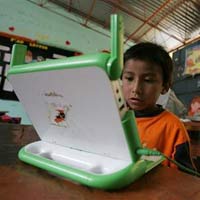
This is the VOA Special English Development Report.
Market researchers estimate that more than one billion personal computers are in use worldwide. Availability has improved in developing countries, but still remains limited compared to industrialized nations. Experts continue to debate how best to close this digital divide.
Nicholas Negroponte established the One Laptop Per Child project in 2005. He would like to put a low-cost laptop in the hands of every child, especially those living in extreme poverty. His nonprofit organization has shipped its specially designed laptop to developing countries around the world.
NICHOLAS NEGROPONTE: "It is now already in the hands of 1.2 million children, in 31 countries, 19 languages. And one country, Uruguay, has just completed doing every single child in the country."
But the program has critics. They say trying to supply every child with a laptop, even at the current price of 160 dollars, is costly and inefficient.
Stephen Dukker also makes low-cost computers. But his can run programs and applications for several students at once. He says these "virtual desktops" lower costs, reduce energy use and lessen the need for technical support. His company NComputing says it has set up over 40,000 networks in more than 100 countries.
Stephen Dukker says all you need to connect to a network is a keyboard and monitor.
STEPHEN DUKKER: "You think you've got your own computer all to yourself and you can't tell the difference that you're working on something other than a computer and sharing this other resource and doing it at a much lower cost than having your own PC."
As computers reach more children in developing countries, so too in many cases is the Internet. It can be a great educational tool. But children also need to learn about the possible threats that can be found on social networks and other sites.
Mark Matunga is with Microsoft East Africa in Kenya. He says poverty may put African children especially at risk.
MARK MATUNGA: "They're being told that, 'Hey you know what, I can send you a few dollars. I can come and visit you. I can buy you a ticket. You come to my country.'"
His company is working with the Kenyan government and a children's rights group. Mark Matunga says the coalition is trying to educate the public about how to protect children from online abuse.
And that's the VOA Special English Development Report, written by June Simms with reporting by Adam Phillips and Cathy Majtenyi. Want to learn more about international development and technology? You can find transcripts, MP3s and podcasts of our programs at voaspecialenglish.com. I'm Steve Ember.
Educational technology: not just computers
TV series teaches children around world to read
(来源:VOA 编辑:陈丹妮)
